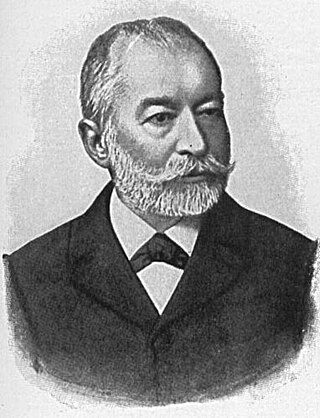Top Qs
Timeline
Chat
Perspective
Dimitrie Sturdza
Romanian statesman and author (1833–1914) From Wikipedia, the free encyclopedia
Remove ads
Dimitrie A. Sturdza (Romanian pronunciation: [diˈmitri.e ˈsturza] ⓘ, in full Dimitrie Alexandru Sturdza-Miclăușanu; 25 February 1833 – 8 October 1914) was a Romanian statesman and author of the late 19th century, and president of the Romanian Academy between 1882 and 1884. He was an aristocrat and member of the House of Sturdza.
Remove ads
Biography
Summarize
Perspective
Born in Miclăuşeni, Moldavia, and educated in Iași at the Academia Mihăileană, he continued his studies in Germany at Munich, Göttingen, Bonn, and Berlin.[1] He took part in the political movements of the time.

Sturdza was private secretary to Prince Alexandru Ioan Cuza in the early years of his reign.[2] During this time he also held a couple of ministerial posts in the Moldavian government (Minister of Cults and Education - 1859, Minister of Public Works - 1861). He afterwards turned against the increasingly unsanctioned rule of Cuza, becoming one of the most zealous promoters of his overthrow. In 1866, he joined Ion C. Brătianu and others in the deposition of Cuza and the election of Prince Charles of Hohenzollern (later King Carol I of Romania).[1] He was a founding member of the National Liberal Party (1875). In the cabinets of Brătianu, 1876–88, he repeatedly held ministerial posts.[1]
In 1892 he was elected leader of the National Liberal Party in succession to Brătianu, and was four times Prime Minister.[2] During his last term in office, in 1907, Sturdza was called by King Carol I to handle the crisis created by the peasants' revolt of March.
Although noted for his capacity for work, he was also a nationalist, resentful of "aliens"[3] (in line with the anti-Jewish policies of his party), and supported blocking non-Romanians from a large number of social positions. Sturdza was a notorious antisemite, supporting measures such as the expulsion of Romanian Jews, and he was known for his opposition towards the naturalization of the Jews in Romania. He was responsible for the exile of Romanian Jewish intellectuals Moses Gaster and Lazăr Şăineanu.[4]
He was appointed permanent secretary of the Romanian Academy, and became a recognized authority on Romanian numismatics. As secretary of the academy he was instrumental in assisting the publication of the collections of historic documents made by Constantin Hurmuzachi (30 vols., Bucharest, 1876–1897), and other acts and documents, as well as a number of minor political pamphlets of transitory value.[2]
His son Alexandru D. Sturdza, by then a Colonel in the Romanian Army, defected to the Germans in 1916, during World War I.
Remove ads
Works
- La Marche progressive de la Russie sur le Danube (1878)
- Uebersicht der Münzen und Medaillen des Fürstentums Rumänien (1874)
- Europa, Russia, Romania (1888)
- La question des portes de fer et des cataractes du Danube (1899)
- Charles I., roi de Roumanie (1899 et seq.)
- Otu, Petre, Georgescu, Maria: Durchleuchtung eines Verrats. Der Fall des Oberst Alexandru D. Sturdza. Lektor Verlag. Hainburg. 2022.
See also
Notes
References
Wikiwand - on
Seamless Wikipedia browsing. On steroids.
Remove ads

